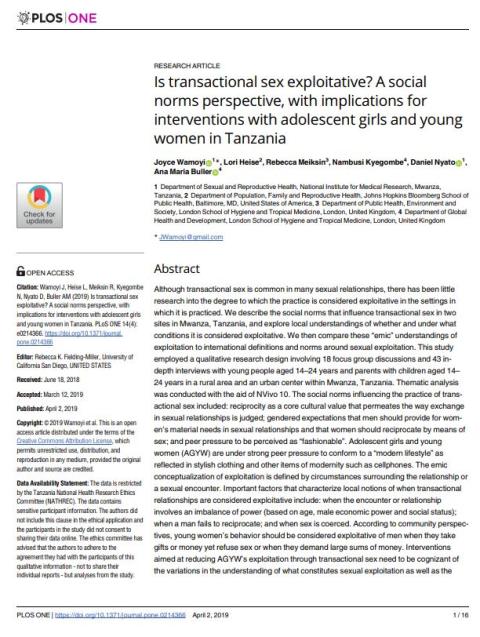- Journal article
- 2 April 2019
Is transactional sex exploitative? A social norms perspective, with implications for interventions with adolescent girls and young women in Tanzania
- Published by: PLOS one

Although transactional sex is common in many sexual relationships, there has been little research into the degree to which the practice is considered exploitative in the settings in which it is practiced. We describe the social norms that influence transactional sex in two sites in Mwanza, Tanzania, and explore local understandings of whether and under what conditions it is considered exploitative. We then compare these “emic” understandings of exploitation to international definitions and norms around sexual exploitation.
This study employed a qualitative research design involving 18 focus group discussions and 43 in-depth interviews with young people aged 14–24 years and parents with children aged 14–24 years in a rural area and an urban center within Mwanza, Tanzania. Thematic analysis was conducted with the aid of NVivo 10. The social norms influencing the practice of transactional sex included: reciprocity as a core cultural value that permeates the way exchange in sexual relationships is judged; gendered expectations that men should provide for women’s material needs in sexual relationships and that women should reciprocate by means of sex; and peer pressure to be perceived as “fashionable”. Adolescent girls and young women (AGYW) are under strong peer pressure to conform to a “modern lifestyle” as reflected in stylish clothing and other items of modernity such as cellphones.
The emic conceptualization of exploitation is defined by circumstances surrounding the relationship or a sexual encounter. Important factors that characterize local notions of when transactional relationships are considered exploitative include: when the encounter or relationship involves an imbalance of power (based on age, male economic power and social status); when a man fails to reciprocate; and when sex is coerced. According to community perspectives, young women’s behavior should be considered exploitative of men when they take gifts or money yet refuse sex or when they demand large sums of money.
Interventions aimed at reducing AGYW’s exploitation through transactional sex need to be cognizant of the variations in the understanding of what constitutes sexual exploitation as well as the social and gender norms influencing the practice of transactional sex. Interventions need to involve communities and families in critical thinking that helps them identify positive alternatives to current gendered social norms that shape the involvement of AGYW and men in transactional sex.
- Countries / Regions:
- Tanzania, Sub-Saharan Africa